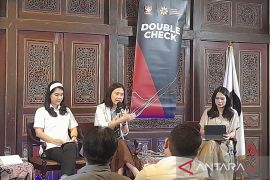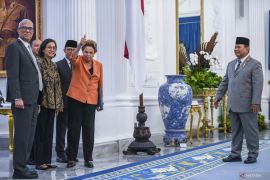This, he said is Indonesia's capital to remain optimistic in facing 2023.
"We welcome 2023 with a spirit of optimism amid the uncertainty of the global situation, both economic and geopolitical threats," Adityaswara stated during the Merdeka Financial Webinar with Islamic Financial Products that was monitored virtually here on Thursday.
He believed that challenges that would not be easy in 2023 should be faced jointly by all domestic stakeholders, including the risk of high interest rates, to reduce the inflation rate.
These challenges also include the threat of inflation due to the uncertainty of the war between Russia and Ukraine that still triggers an increase in inflation in several parts of the world.
Moreover, the impact of the weakening global economy also puts pressure on Indonesia's export performance.
Adityaswara noted that in the midst of the dynamics of the global economy, domestic economic indicators have proven solid.
He affirmed that this is the best capital for the Indonesian people to be more confident in responding to the challenges of 2023 although they have to continue to implement policies that create a prudent multiplier effect on economic growth and the financial sector.
On an annual basis, Indonesia's economy in 2022 will grow solidly by 5.31 percent. In the banking sector, bank credit grew 10.5 percent, and third party funds grew eight percent in January 2023.
In the capital market sector, the number of investors continued to grow to reach 10.6 million as of February 24, 2023, a quite rapid increase as compared to that recorded in 2021 and 2022.
Related news: BI Governor outlines three ways to improve financial inclusion
The non-bank financial industry sector also showed a positive trend in which insurance premium income in January 2023 on a year-on-year (yoy) basis grew 5.22 percent, while pension fund assets grew 5.48 percent.
Adityaswara affirmed that financing receivables in January 2023 grew 14.5 percent as compared to the same period in the previous year.
The increase was mainly driven by working capital and investment financing, which each year-on-year (yoy) grew by 33.7 percent and 20.4 percent. In addition, fintech peer-to-peer lending also grew 63 percent yoy.
In an effort to recover the economy amid global uncertainty, he said Indonesia's Islamic finance sector had proven to be resilient in facing difficult situations, with total assets outside of Islamic shares amounting to Rp2,312 trillion at the end of November 2022.
This figure grew 15 percent from the previous year.
This shows that the Islamic finance sector is a promising sector for the Indonesian economy and society.
"We must make the best use of the positive growth performance of Islamic economic and financial indicators to plan finances to create a financially independent life," he stated.
Related news: Indonesia's economy remains strong amid global uncertainty: official
Related news: BI will continue to support monetary stabilization, sustainable growth
Translator: Martha Herlinawati Simanjuntak, Katriana
Editor: Yuni Arisandy Sinaga
Copyright © ANTARA 2023












